Anna Ulrey - PCT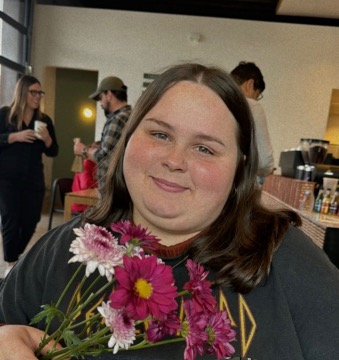
What surprised you the most about medical school?
I kind of expected it to be a grueling, academically-bogged-down time. Don't get me wrong, it sometimes feels that way in Volker the night before a block final. For the most part, though, medical school has been the most fun I've ever had in academics and otherwise. Don't let the fearmongering get to you—you have plenty of time to both succeed in school and spend time with friends, travel, etc.
What has been your favorite block so far and why?
PULMCATION BABY! No, I'm kidding. Pulm was my favorite block, but don't let anyone fool you into thinking it's a vacation. I enjoyed it because the info really made a lot of sense to me and the block directors are great! (Dr. Patel will like you a lot if you tell him that Black Sabbath is not the pioneer of heavy metal. Feel free to tell him I sent you.)
If you are part of any special pathways, what made you apply for that track?
I'm part of the Primary Care Track (PCT) and CUURE Program. I applied to both because I know that I would like to work with underserved populations regardless of where I end up, so I jumped on the opportunity to learn how to better care for these patients early on. A happy benefit is funding.
What are your plans for the summer?
I'll be working on prenatal care research with the Maternal Fetal Medicine program at UAB. I'll also be spending around 6 weeks doing the CUURE Program before heading to Tuscaloosa for a few weeks of PCT camp. Throughout all this, I'll also be planning the upcoming semester as LC rep with Tolani for Finley ? as well as prepping for this year's LC Olympics (get ready guys) and LC Cup!
Raksha Ramadas - General MD & CU2RE
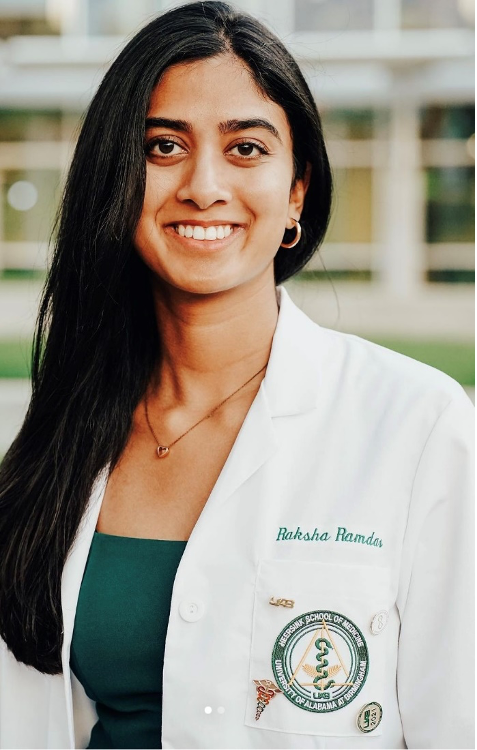 What surprised you the most about medical school?
What surprised you the most about medical school?
As a nontraditional student, I was very apprehensive as to whether I would be prepared for the rigor that was medical school, if I was ready to adapt to this significant life change, and if I could handle the high-stakes nature of medical education. For the first few months of the year, I think the stress of finding the best way to approach medical school had narrowed my perspective, so much so that I had lost sight of my broader purpose. It wasn’t until I let go of the pressure to have everything figured out that I truly found happiness in both my education and my life outside of school. What surprised me about medical school is the opportunities available for you to pave your own path and do what makes you happy, contrary to the idea that there are boxes to check off and certain ways to do things. Don’t use Anki and prefer pictures or diagrams instead? Awesome! Would you rather take a break from studying and go see your favorite basketball team instead? You can have fun and still be successful. Don’t want to pursue leadership roles and prefer serving your community? Great, go for it! Follow your passions and really think about what is most fulfilling for you. Not only would this enrich your experiences and medical education in ways you wouldn’t expect, but it also makes medical school a lot more rewarding and a lot less stressful!
What has been your favorite block so far and why?
My favorite block in Fundamentals has to be microbiology! We all grew up hearing about different bacteria and viruses on the news and in popular culture, so when the time came for us to learn about these in depth and in a clinical context, it was fascinating! I had a huge smile on my face when I first realized what H1N1 flu actually meant! So far, I have been loving different parts of the organ modules we have done so far. Cardiovascular physiology shows you how intricate of a machine our heart is. Turns out, with pulmonary physiology, there’s a whole lot more to breathing than we think! GI pathology has taught me how well our organs function in sync to help us perform vital, everyday functions. You’re in for a treat!
If you are part of any special pathways, what made you apply for that track?
I am a student with CU2RE, a program for medical students dedicated to serving as primary care physicians in the medically underserved urban and rural areas of Alabama. From a young age, I have helped a loved one navigate through the experience of being a patient who is uninsured. I learned of social determinants of health and the profound impact this has on a patient’s health outcomes. Without a primary care physician, a patient lacks a first point of contact who is readily accessible for general needs, a physician to emphasize preventative care measures to catch diseases early and reduce costs in the long term, a coordinating physician to oversee referrals to specialists to ensure all aspects of care are covered, and the continuity of care. Seeing my loved one struggle without a primary care physician, I understood the profound impact that a primary care physician has on a patient and as well as the larger community. I wanted to learn more the issues plaguing underserved areas of Alabama and how I can be a part of the solution for our patients.
What are your plans for the summer?
You will find me watching sports-most likely basketball, doing shoots for clients as part of my photography business, traveling around the country and visiting my long-distance friends, chasing down more bucket list experiences, and playing as much as possible when I am not doing clinical research with Med-Peds at the STEP clinic this summer!
Alex Kahn - MSTP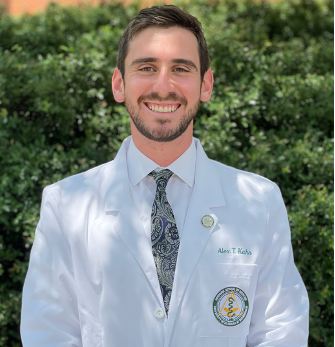
What surprised you the most about medical school?
I was most surprised by the amount of patient contact we have as first-year students! UAB places a strong emphasis on integrating what we have learned in class and seeing it in a variety of clinical settings. These settings range from working with fake mannequins in the SimLab to working with real patients in a real hospital. It is very cool to see what we are learning about present in patients, and it helps to make the information stick when we see conditions in real life and not just on a slide.
What has been your favorite block so far and why?
It is a close race between Block 2 of Fundamentals (Anatomy/Histology) and Cardio, but I think Cardio may take it. After finishing Fundamentals, it was a bit hard to see how everything fit together clinically. Once starting Cardio and learning about the pathophysiology of diseases, it all starts to make everything a bit clearer. I am most looking forward to Neuro though (hot take)
If you are part of any special pathways, what made you apply for that track?
No special pathways, although the MSTP is unique and guarantees the Birmingham campus. Applying to medical school, I only applied to MD/PhD Programs, so I was committed to the long haul.
What are your plans for the summer?
As a part of the MSTP, our job for the summer is to rotate in a lab where we may pursue our PhD! The program is designed for students to complete the 2 pre-clinical years and then transition into the PhD years after completing Step 1. With a background in clinical neuroscience and an interest in neurodegeneration, my goal is to find a lab that combines those!
Alex Hyde – Rural Medicine Program
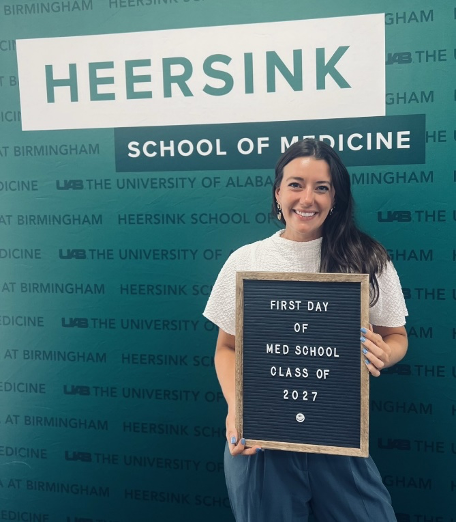 What surprised you the most about medical school?
What surprised you the most about medical school?
I was surprised by how manageable school actually can be. Coming in you hear about how you’re “drinking from a fire hose” with all the information you learn, activities to be involved in, and things to do. However, I found that as long as you manage your time well, you will be surprised how much extra time you actually have! This semester I was able to participate in many school related activities, study, and find new hobbies such as playing pickleball and gardening.
What has been your favorite block so far and why?
My favorite block so far was definitely Microbiology with Dr. Patel and Dr. Walker. I really enjoyed learning about all the different bugs and drugs. And to mention, it (sometimes) did not feel like studying with how much Sketchy Med I was watching. Now that we are finishing our first year, I am very glad that I was interested in that block because it has found a way to follow us into each organ module!
If you are part of any special pathways, what made you apply for that track?
I am a student with the Rural Medical Program Tuscaloosa campus. I grew up in a really small town in North Alabama on the Tennessee River so I knew that I qualified for the special pathway. However, once I met with Dr. Lavender in Tuscaloosa and found out more about the program, I knew I wanted to apply. In addition to being a part of a program that has been around for more than 27 years, we also have the opportunity to work in rural community settings our 3rd and 4th years.
What are your plans for the summer?
I have applied to the MSSRP program to fund research in an area I am interested in at this moment. Outside of school I am planning to do some continued education for my yoga teacher training, play pickleball as often as I can, and go visit my family in North Alabama.
Charis Hodges - MD/MSPH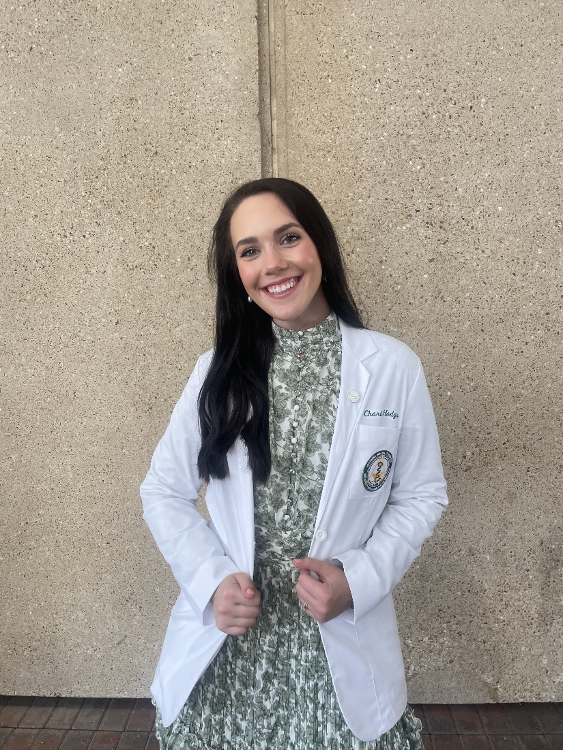
What surprised you the most about medical school?
The ability you have to make this experience your own. Before starting, I thought the pre-clinical years would be spent with my head in a book and doing little else. In reality, there are so many opportunities to help craft the medical school experience you want- research, interest groups, service organizations, shadowing, et cetera. It’s helped me grow as a student and find my niche over time. The faculty enjoy teaching and interacting with students and are so supportive. Medical school is still hard, but being able to hear and learn from people who made it through and are now practicing is always encouraging. Being in a dual-degree program, I was worried that I would be overwhelmed with extra classes and that I wouldn’t be able to manage a master’s degree on top of medical school. I’ve found that the things I learn in the School of Public Health actually integrate really well into what I learn in the School of Medicine, and I’m loving it so far. I was most concerned about having time for the things I love outside of school, but prioritizing my friends and family has been so beneficial for me. You need to make time for your support system.
If you are part of any special pathways, what made you apply for that track?
Not a special pathway per se, but I’m in the MD/MSPH program. I’m on the 4-year track, so I’m taking MSPH classes concurrently with medical school. I’ve always been interested in epidemiology and infectious disease- I was actually wanting to pursue public health before I became interested in medicine, but I liked research, too. The MD/MSPH option was the perfect solution. I chose MD/MSPH over MD/MPH because of the research focus, and the Outcomes Research concentration provides really useful training for anyone interested in examining the effectiveness of different interventions. My master’s thesis will be my scholarly activity, and I’m working with a PI in the Division of Infectious Diseases with fungal infections as my research focus.
What has been your favorite block so far and why?
Micro! I’m biased because I majored in microbiology in undergrad, but I found all the pathogens we learned about so interesting. As a public health student, everything we learned tied in really well. Dr. Patel and Dr. Walker are fantastic teachers and love what they do. I liked how the block was divided into bacteria, viruses, then fungi/parasites, and all the material felt easy to follow. It’s the last block of Fundamentals, so I felt like I had finally found my groove and a studying system that works for me by that point in the semester.
What are your plans for the summer?
I’ll be working on research for my master’s and taking two MSPH classes. At the School of Medicine, I’ll be training to be an MSS peer educator, working on Compassion Closet advertising (come volunteer with us!), and will hopefully knock out a few special topics courses. I’m also traveling to Croatia in June!